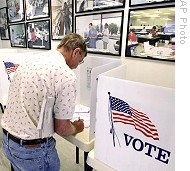VOA标准英语10月-Analysts Say Swing States Hold Key to US Election
时间:2019-01-09 作者:英语课 分类:VOA标准英语2008年(十月)

Man votes early in Norwalk, California 06 Oct 2008
In the 2000 election, Democrat 3 Al Gore 4 won more popular votes than his Republican opponent, then Texas governor George Bush. But Mr. Bush won the election because he defeated Gore in the electoral vote tally 5.
Each state has a certain number of electoral votes based on the number of Senate and House members who represent that state in Congress. Each state has two senators, but the number of House seats for a given state depends on population.
California, the largest state, has 53 House members and two senators, for a total of 55 electoral votes. Wyoming, one of the smallest states, has only three electoral votes, taking into account its two U.S. senators and one House member.

US presidential candidates Barack Obama in Fayetteville, N.C. and John McCain in Toledo, Ohio, 19 Oct 2008
As they campaign in the final days, both Barack Obama and John McCain will try to cobble together enough electoral votes to get to the magic number of 270 to clinch 6 the presidency 7.
American University expert Curtis Gans says each candidate looks at the electoral map of the country differently.
"Every candidate in this polarized country at this point starts with a number of states that are clearly their states to win, and a number of states that are their states to lose," Gans said.
As in most presidential elections, the candidates wind up focusing on a relatively small handful of so-called swing or battleground states, states where the race is close and states that have enough electoral votes to make a difference in the outcome of the election.
Larry Sabato directs the Center for Politics at the University of Virginia.
"Out of the 50 states, about 40 of them are almost predetermined, and we can call them today. So, the focus is on ten competitive states, relatively competitive," Sabato explained. "Some of them are complete toss-ups, could go in either direction. I think Ohio and Virginia are in that category. Others may be leaning one way or another. So, we tend to focus on these states because they are the ones in the end who determine who is going to be president."
For example, Republican presidential candidates tend to do well in the deep South and the Plains states. Democrats 8 do well in the Northeast, along the Pacific coast and in the upper Midwest.
That leaves 10 to 12 swing states where both campaigns are competitive, states that will provide the margin of victory on November 4.
Dennis Johnson is a political expert at George Washington University.
"When you think about the strategy of an election, the most important number is 270. And that is the number of electors that will get you over the top (to win the presidency). And, any combination of states that has 270, that is the magic number that you are really looking for," Johnson said.
Recent polls give Democrat Barack Obama an edge in some of the larger swing or battleground states, states like Pennsylvania, Ohio, Michigan and Indiana.
Obama has been leading even in Florida, the state that gave President Bush his narrow victory over Al Gore in 2000.
Obama is also doing well in states like Nevada, Colorado and even North Carolina, all of which have tended to vote Republican in recent years.
Tom DeFrank is Washington bureau chief of the New York Daily News and a longtime observer of U.S. politics.
"These are states that are usually Republican, for the most part, and states that McCain has to win," DeFrank said. "And so, Obama has an easier path. He has got a better electoral map and he has got momentum 9 on his side and it would take a string of things to go McCain's way for this trend to be reversed. It could happen but it's not likely at the moment."
National polls are important in the closing days of the presidential race. But experts will be keeping a close eye on the race in several individual key states on election night, as they watch to see which of the two candidates will get to the magic number of 270 electoral votes first.
- The rabbit is a relatively recent introduction in Australia.兔子是相对较新引入澳大利亚的物种。
- The operation was relatively painless.手术相对来说不痛。
- We allowed a margin of 20 minutes in catching the train.我们有20分钟的余地赶火车。
- The village is situated at the margin of a forest.村子位于森林的边缘。
- The Democrat and the Public criticized each other.民主党人和共和党人互相攻击。
- About two years later,he was defeated by Democrat Jimmy Carter.大约两年后,他被民主党人杰米卡特击败。
- The fox lay dying in a pool of gore.狐狸倒在血泊中奄奄一息。
- Carruthers had been gored by a rhinoceros.卡拉瑟斯被犀牛顶伤了。
- Don't forget to keep a careful tally of what you spend.别忘了仔细记下你的开支账目。
- The facts mentioned in the report tally to every detail.报告中所提到的事实都丝毫不差。
- Clinch the boards together.用钉子把木板钉牢在一起。
- We don't accept us dollars,please Swiss francs to clinch a deal business.我方不收美元,请最好用瑞士法郎来成交生意。
- Roosevelt was elected four times to the presidency of the United States.罗斯福连续当选四届美国总统。
- Two candidates are emerging as contestants for the presidency.两位候选人最终成为总统职位竞争者。
- The Democrats held a pep rally on Capitol Hill yesterday. 民主党昨天在国会山召开了竞选誓师大会。
- The democrats organize a filibuster in the senate. 民主党党员组织了阻挠议事。 来自《简明英汉词典》